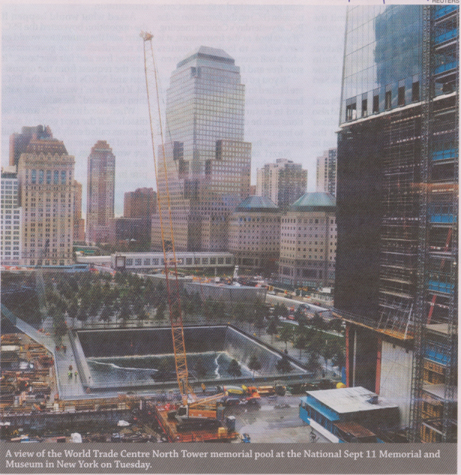MY SAY: Sept 11 – what else must change
Professor Tan Sri Dato' Dzulkifli Abdul Razak
My Say
The Edge Malaysia - 08-09-2011
I CAN still recall where I was 10 years ago on Sept 11 when someone in the same elevator mentioned rather casually about the World Trade Center (WTC) in New York was on fire. It sounded like another fire hazard that buildings are prone to. The small talk ceased as the conversation changed to another subject.

This was on the way to a university dinner gathering in one of the hotels in Kota Kinabalu, Sabah. The discussion continued to be a subject of interest when we were informed that an aeroplane was the cause of the fire. The incident was rather unusual, but it had happened before on a smaller scale. The focus digressed to the issue of safety. No one really knew what actually took place, at least not until the dinner was over.
Even then, many were still sceptical — someone crashed a fully-fuelled wide-bodied aeroplane on purpose into the WTC? Not one, but both the towers! It was hard to imagine why.
As it turned out we were not the only ones who were taken by surprise. The then US President, George W Bush, was too. The picture showing him holding The Pet-Goat book upside down at a school in Florida is still remembered. He was supposed to be reading with the class of second-graders then. His facial expression looked very troubled when the White House chief of staff whispered to him about the tragedy.
More so, the students in the class were left pondering what wrong they had done to have upset the President. Did they read the wrong page?
Regardless, almost everyone agreed that the incident would have changed the world. With the cry of "War on Terror" and the controversial events leading to it, this must be the case.
A decade later what seems most obvious, according to an analysis by historian Melvyn Leffler (Foreign Policy, Sept/Oct 2011) are the following. First, US defence spending increased from US$304 billion (RM906 billion) in 2001 to US$616 billion in 2008, "even as the US budget turned from a surplus of US$128 billion to a deficit of US$458 billion".
Second, the US debt held by foreign governments more than doubled from 13% at the end of the Cold War to close to 30% at the end of the Bush term. Third, quoting the Freedom House's 2010 annual report on the state of global political rights and civil liberties, "2009 was the fourth straight year in which more countries saw a decline in freedom and the longest continuous period of deterioration in the nearly 40-year history of the report".
Fourth, the number of terrorist incidents rose during the War on Terror, alleging that US actions fuelled them. A 2008 report from the non-partisan Centre for Strategic and Budgetary Assessments on counter terrorism concluded: Since 2000-2003, the overall US
position in the Global War on Terror has slipped, despite the capture and killing of terrorist leaders and other "successes" abroad.
Fifth is about the "metastasis" and intensification of the various movements linked to the terrorist activities, as well as "the growth in the number and political influence". Leading experts are "sceptical" if the trends will change even with the killing of al-Qaeda chief Osama bin Laden.
In fact, Leffler was of the opinion that 9/11 “did not change the world or transform the long-term trajectory of the US grand strategy" — for example, its quest for primacy and desire to lead the world "all these remain and remained unchanged" — which underlined the US exceptionalism that it is qualitatively different from other nations.
This is a myth that is rooted in understanding history as famously purveyed, well before the tragedy of 9/11, through theories like the Clash of Civilisation expounded by Samuel Huntington who was closely associated with the White House and the Pentagon.
Indeed, Huntington's theory seemed to have been vindicated by the unfolding of 9/11. The rhetoric that followed was pointing to the reality of a clash of civilisation predominantly along the West and non-West fault line. It fell neatly in place in quest of primacy and desire to lead the world, while propagating the unchanging idea of American exceptionalism.
Embedded in his theory, however, Huntington also recognised that: "The West won the world not by superiority of ideas or values or religion but rather by its superiority in applying organised violence. Westerners often forget this fact; non-Westerners never do." Perhaps this is one point that we have missed all along.
As we revisit the 10th anniversary of the tragic events of 9/11 and regret the death of many innocent lives, including those over the 10-year period, we need to re-examine this preponderance of "organised violence" The two world wars have been cited as intra-civilisational clashes that stand to this fact where other non-West civilisations were hardly involved.
In other words, the perception of being "exceptional" and thus the tendency to blatantly shift the blame entirely to the "other" must be immediately changed. Otherwise, we are playing into the hands of those adept at the game of organised violence”.
* The writer is the Vice-Chancellor of Universiti Sains Malaysia. He can be contacted at vc@usm.my
